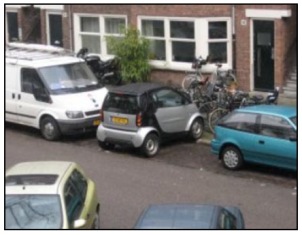 The famous American entertainer Will Rodgers once quipped “[P]olitics ain’t worrying this country one-tenth as much as where to find a parking space.” If you are frustrated by parking problems, then rest assured you are not alone. All of us have experienced the stress that comes from arriving at your destination only to have to circle the block searching for a parking spot. With Canada’s cities and towns set to grow by 12 million people in the next 40 years our current parking problems seem destined to deteriorate.
The famous American entertainer Will Rodgers once quipped “[P]olitics ain’t worrying this country one-tenth as much as where to find a parking space.” If you are frustrated by parking problems, then rest assured you are not alone. All of us have experienced the stress that comes from arriving at your destination only to have to circle the block searching for a parking spot. With Canada’s cities and towns set to grow by 12 million people in the next 40 years our current parking problems seem destined to deteriorate.So why don’t municipalities provide more parking? In their defense, municipalities must try to balance the need for parking against the costs of providing it, especially the land it takes up. In larger cities, providing more parking can also indirectly contribute to increased congestion and take up space that may be better used for other things, such as sidewalks. However, should rapid urban growth, worsening congestion and limited space mean we ignore parking problems altogether, especially when a lack of convenient and affordable parking could see drivers spend their money elsewhere? The answer to these questions is a resounding “no.”
Instead, this paper suggests a combination of accurate pricing and smart technologies can resolve many of the parking problems that currently plague Canadian cities. Accurate pricing sets high prices at times of high demand, and vice versa, in much the same way as the price of airfares depends on the demand for specific flights.
Accurate pricing will mean that the price of parking varies between different parts of the city and at different times of the day. This encourages the demand for parking to spread out—in much the same way that cheap airfares encourage price sensitive passengers to fly at off peak times. Accurate pricing sets the price of parking as low as possible, while ensuring that some spots are always available for those drivers that really need it.
In this way, accurate pricing delivers convenient and affordable parking for drivers, while removing the need for inflexible parking restrictions, such as time limits. Accurate pricing benefits municipalities because it increases the efficiency with which existing parking is used and alleviates the need to provide more parking (as in the case of roads, simply increasing the supply of parking does not ensure an optimal level of availability in the absence of accurate pricing). Finally, accurate pricing allows cars to park quicker thereby alleviating congestion. San Francisco is already trialing such a system, where the price of parking is allowed to vary from $0.25 to $6 per hour, depending on demand. Drivers can use a free smart phone app or the internet to find where parking is available.
These types of initiatives have potential to solve many of our parking problems and reduce the “worry” involved in finding a parking space. It is time for municipalities to implement effective, durable parking policies that deliver convenient, affordable parking when and where you need it.
View entire study as PDF (19 Pages)
 The famous American entertainer Will Rodgers once quipped “[P]olitics ain’t worrying this country one-tenth as much as where to find a parking space.” If you are frustrated by parking problems, then rest assured you are not alone. All of us have experienced the stress that comes from arriving at your destination only to have to circle the block searching for a parking spot. With Canada’s cities and towns set to grow by 12 million people in the next 40 years our current parking problems seem destined to deteriorate.
The famous American entertainer Will Rodgers once quipped “[P]olitics ain’t worrying this country one-tenth as much as where to find a parking space.” If you are frustrated by parking problems, then rest assured you are not alone. All of us have experienced the stress that comes from arriving at your destination only to have to circle the block searching for a parking spot. With Canada’s cities and towns set to grow by 12 million people in the next 40 years our current parking problems seem destined to deteriorate.

